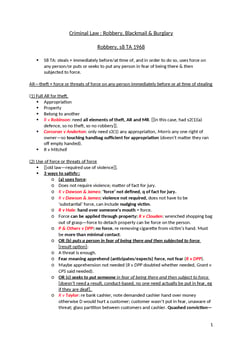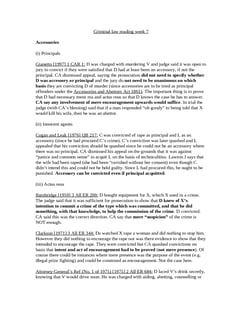Sweet v Parsley [1970] AC 132
Judgement for the case Sweet v Parsley
Table Of Contents
KEY POINTS
In drug-related statutory offenses under the Dangerous Drugs Act, 1965 (c. 15), s. 5, "Mens rea," or the defendant's guilty intent, plays a crucial role. It assesses the defendant's mental state to determine criminal intent, differentiating unintentional involvement from intentional wrongdoing. The court considers factors like knowledge and intent to ensure justice is served fairly.
The Act outlines specific criteria for someone to be deemed "concerned in the management of" premises used for cannabis smoking. These criteria help authorities identify those with control over such places.
Differentiating between landlords indirectly linked to drug activities and active participants is vital, impacting legal consequences. Precise interpretation and application of these criteria maintain legal integrity, ensuring equitable justice administration.
FACTS
The appellant, who held the position of sub-tenant in a farmhouse, had sublet multiple rooms to tenants who collectively shared the kitchen facilities. Initially, she not only retained possession of a bedroom within the premises but also inhabited it. However, at a later juncture, she ceased her residency there, opting instead for occasional visits primarily to retrieve mail and collect rent.
On June 11, 1967, authorities stumbled upon significant quantities of drugs, including cannabis resin, within the confines of the farmhouse. The appellant found herself facing charges related to her involvement in the management of premises utilized for the consumption of cannabis resin, a violation of section 5 (b) of the Dangerous Drugs Act, 1965.
The appellant did acknowledge that the premises had indeed been utilized for this illicit purpose, while the prosecutor conceded the appellant's lack of awareness regarding these activities.
As a consequence of her conviction for this offense, the appellant sought recourse through an appeal from the Queen's Bench Division.
JUDGEMENT
The judgment declared that the offense under section 5 (b) of the Dangerous Drugs Act, 1965, was not absolute, leading to the quashing of the conviction. The key point was the interpretation of "used for the purpose," which referred to management intent. Mens rea, or guilty intent, was deemed essential.
The court stressed that mens rea was crucial in all offenses except under exceptional circumstances. An offense wouldn't be considered absolute unless Parliament intended it as such.
-
Lord Diplock added a general principle:
when interpreting any criminal offense provision, language implying a mental element must be considered, even if it's not explicit, and it should imply the absence of a genuine belief, held honestly and reasonably, that facts making the act innocent exist.
COMMENTARY
The appellant, a sub-tenant of a farmhouse, sublet rooms to tenants and occasionally visited the premises after giving up her bedroom.
Authorities discovered drugs, including cannabis resin, on the premises, leading to charges under section 5 (b) of the Dangerous Drugs Act, 1965.
The appellant admitted the premises' drug use, but the prosecutor was unaware.
The initial conviction was quashed as the court ruled that mens rea (guilty intent) was essential, and the offense wasn't absolute.
The judgment highlighted the importance of mens rea in most offenses, unless Parliament explicitly intended otherwise, and emphasized considering a mental element when interpreting criminal provisions.
ORIGINAL ANALYSIS
A woman let out a farmhouse to people, without knowing that they were using drugs.
Section 5 of Dangerous Drugs Act 1965 says that anyone managing the premises “used for the purpose” taking illegal drugs is guilty.
She was convicted.
The HL allowed her appeal.
Lord Diplock
-
Claims that anyone who has undertaken to learn the facts and the law cannot be penalised without criminal intent, as it would be “contrary to a rational and civilised criminal code,” and he claims this must have been parliament’s intention.
(He is basically denying the existence of strict liability crimes, despite the clear meaning of section b).
-
A better argument is that the act makes liable anyone “concerned in the management of any premises used for the purpose…” etc.
The purpose refers to the “management”, not the “drug taking”.
“Preparation for smoking opium” can only be referring to management since it is not actually the taking of a drug.
For Further Study on Sweet v Parsley

A collection of the best GDL notes the director of Oxbridge Notes (an O...
Need instant answers? Our AI exam tutor is here to help.
Ask questions 🙋 Get answers 📔 It's simple 👁️👄👁️
Our AI is educated by the highest scoring students across all subjects and schools. Join hundreds of your peers today.
Get StartedRelated Product Samples
These product samples contain the same concepts we cover in this case.
| Criminal Law | Homicide Notes (20 pages) |
| GDL Criminal Law | Mens Rea Notes (9 pages) |

 Since 2010, Oxbridge Notes has been a trusted education marketplace, supplying high-quality materials from top achievers at universities like Oxford, Cambridge, LSE, Harvard, and Yale.
Since 2010, Oxbridge Notes has been a trusted education marketplace, supplying high-quality materials from top achievers at universities like Oxford, Cambridge, LSE, Harvard, and Yale.